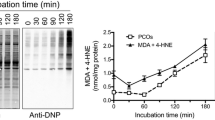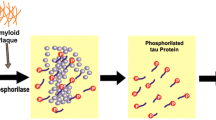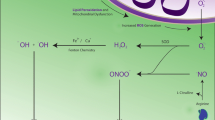Summary.
In order to assess the integrity of antioxidant enzymes in Alzheimer's disease, the activities of glutathione peroxidase, glutathione reductase and two enzymes of the pentose phosphate pathway (glucose-6-phosphate dehydrogenase and 6-phosphonogluconate dehydrogenase) were determined in three regions of postmortem neocortex of controls and sub-jects with Alzheimer's disease. The activities of glutathione peroxidase and glutathione reductase were unaffected in Alzheimer's disease. By contrast, there was a selective increase in the activities of glucose-6-phosphate dehydrogenase and 6-phosphonogluconate dehydrogenase in the inferior temporal cortex of Alzheimer subjects. These changes negatively correlated with the Fe2+/ascorbate-induced lipid peroxidation which (in a previous study of the same subjects) was also found to be selectively elevated in the inferior temporal cortex. Increased activity of the pentose phosphate pathway probably occurs in response to increased prooxidant activity since both glucose-6-phosphate and 6-phosphonogluconate inhibited H2O2-induced lipid peroxidation in a concentration dependant fashion (IC50 = 504 ± 105 μM and 88 ± 12 μM, respectively). Together, these data suggest that not only is oxidative stress a feature of Alzheimer's disease, but also that it occurs because of increased prooxidant activity rather than a diminished antioxidant capacity.
Similar content being viewed by others
Author information
Authors and Affiliations
Additional information
Received July 9, 1998; accepted October 26, 1998
Rights and permissions
About this article
Cite this article
Palmer, A. The activity of the pentose phosphate pathway is increased in response to oxidative stress in Alzheimer's disease. J Neural Transm 106, 317–328 (1999). https://doi.org/10.1007/s007020050161
Issue Date:
DOI: https://doi.org/10.1007/s007020050161




